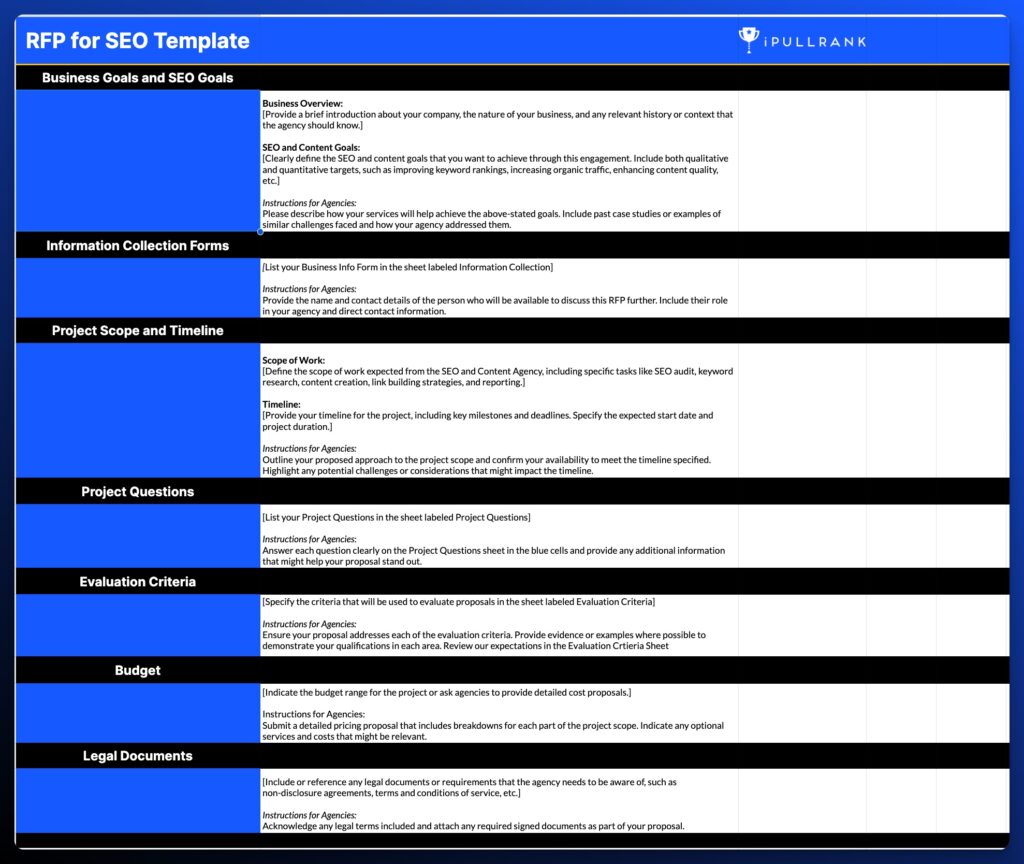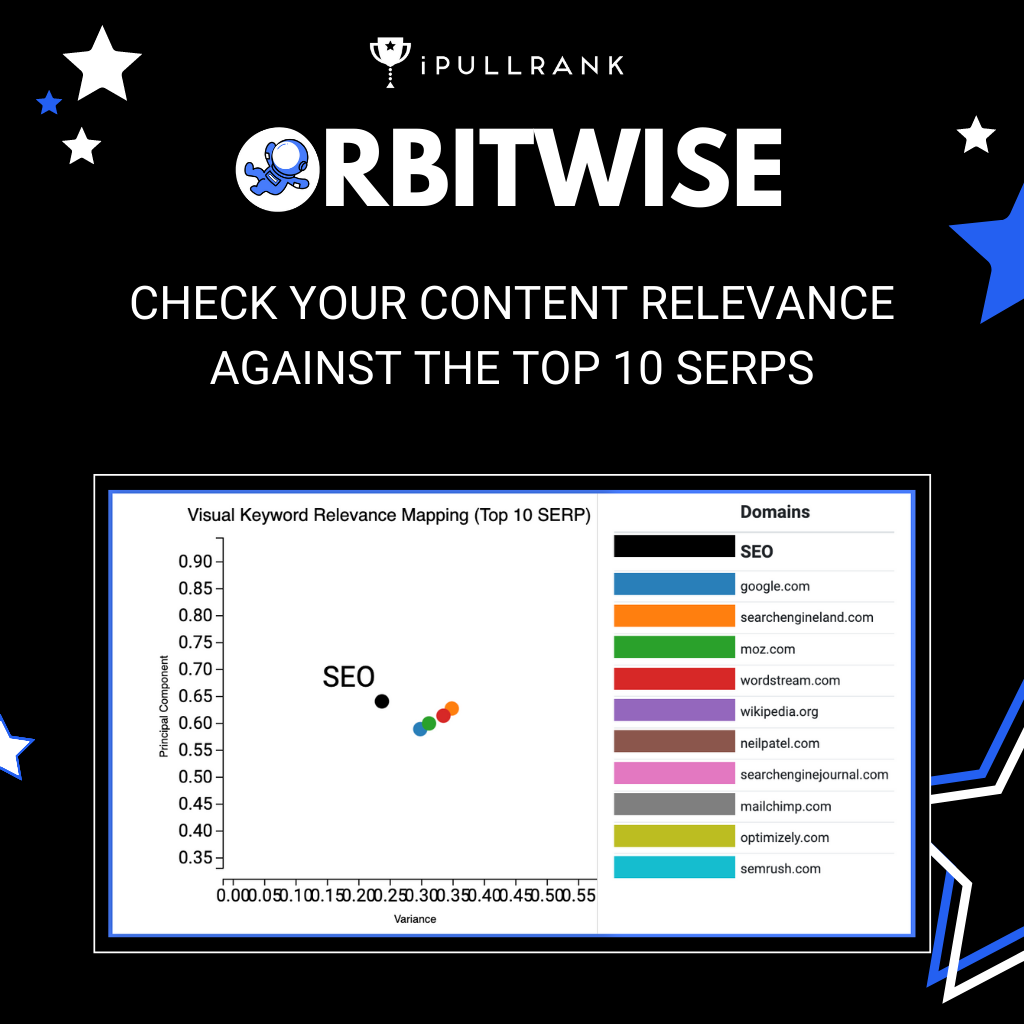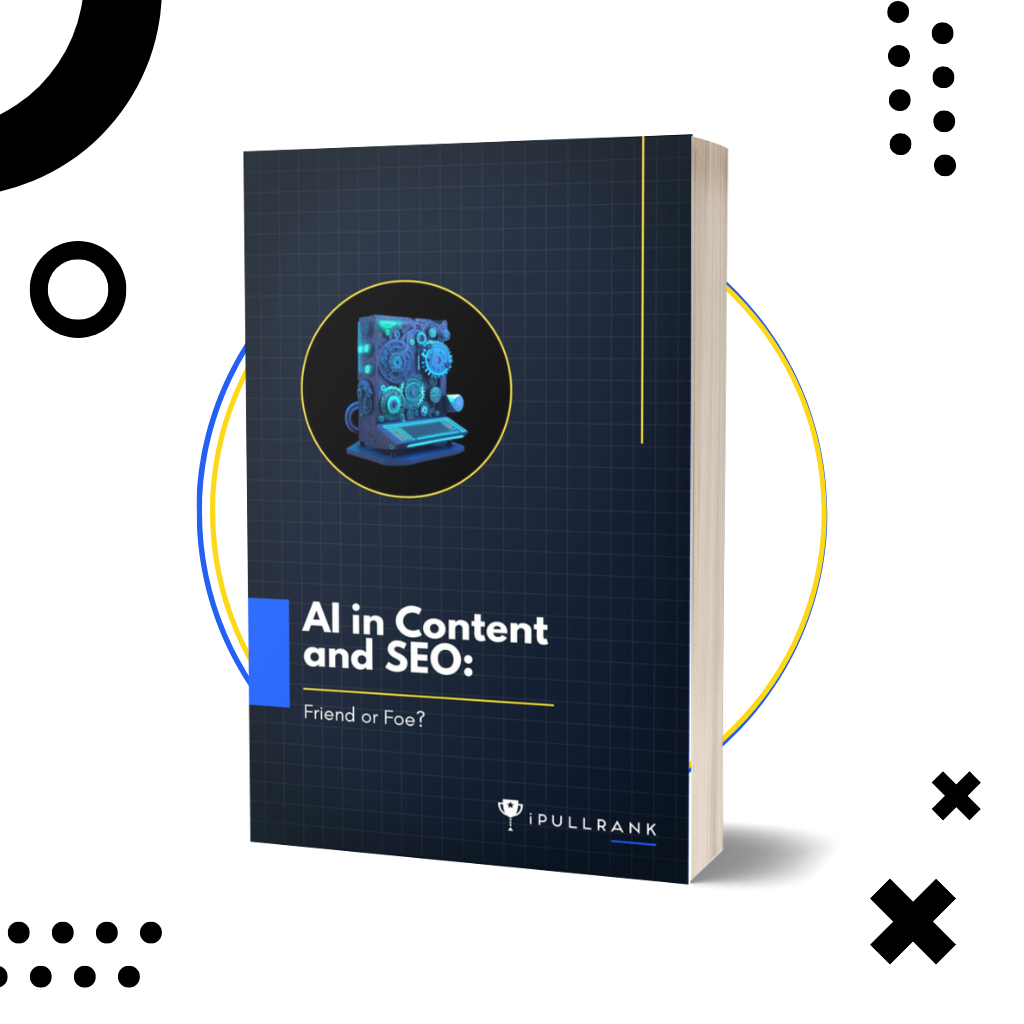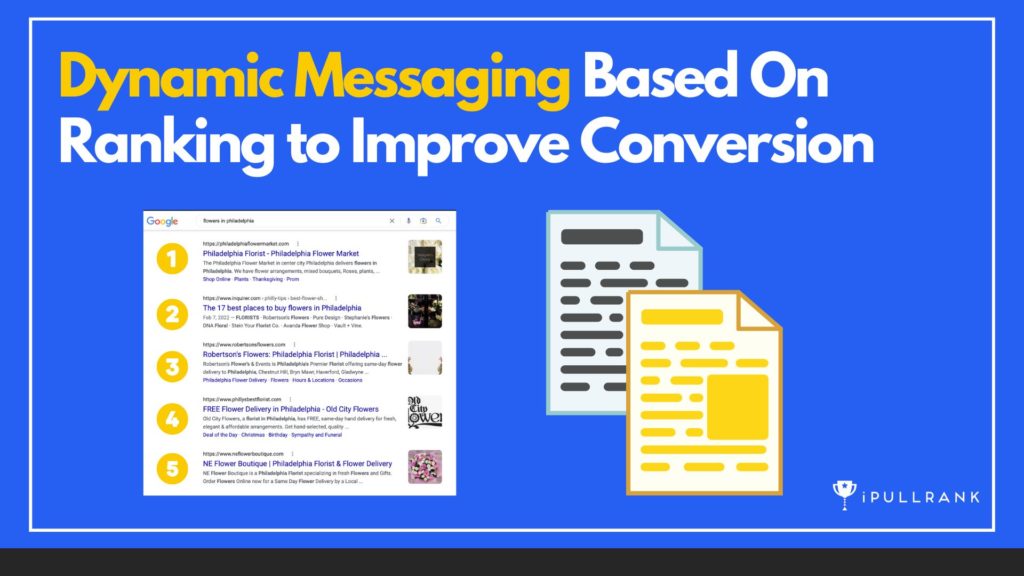Transparency, respect, and good intentions are the ingredients of a high-quality RFP for any self-respecting business.
Choosing the wrong agency has disastrous consequences. You can’t afford to get it wrong. Finding that long-term partner can fundamentally change the trajectory of your business.
But bad faith players on both sides have corrupted the RFP process for too many of us.
Real talk? RFPs are unnecessary. Large organizations have procedures. Checks and balances. “We always did it this way.” But nine times out of ten, an RFP is being used to investigate market rates, negotiate lower rates, and check off a checkbox.
Before you fire off a generic form you were ‘gifted’ by previous colleagues or one you researched online, take a moment and a step back.
Try OUR super generic RFP template. Nah, it’s not generic, it includes the great elements we’ve seen across useful RFPs and specific ways to customize them for your business.

Table of Contents
Let’s look into why the RFP process is broken, what we can do to fix it, and how you can facilitate an honest process that treats everyone with respect.
Are Request for Proposals a Necessary Evil?
To facilitate organizational change, you need to work within the system. Depending on your standing in your organization, you might not have the authority to kick the RFP process to the curb. But that doesn’t mean you can’t leverage the RFP to elevate your team and the importance of SEO within your organization.
Silver lining. It’s an opportunity. Mange an SEO RFP effectively and you could set yourself up for promotions, accolades, institutional trust, and dependability that you’re working hard to earn daily.
The first critical questions for your SEO RFP project:
- Who are you?
- What’s your role?
- Why are you in charge of this process or who are you researching this for?
An SEO Request for Proposal (RFP) is one meaty step in hiring an agency.
When you’re the one responsible for managing an SEO RFP, there are several questions to be answered, materials to collect, and people to involve.
Let’s dive into what you can do to streamline your SEO RFP process, make it worth your while, and attract the right SEO partner to accomplish what you need in Organic Search.
Understanding the Purpose of an RFP for SEO Services
Everyone wants to do an apples-to-apples comparison of SEO agencies, but entering into the RFP process with this mindset misses the point.
When you box in your agencies, you’re typically preventing them from showcasing how they’re different and where they excel.
If you force everyone into the same format and ask questions about things that don’t matter, you’re wasting everyone’s time without getting closer to what you need.
A talented SEO agency should have the tools and strategy to achieve what you want, educate you on what you didn’t know you needed, and partner with you to make you and your boss and your boss’s boss look good.
There are a few reasons to launch an SEO RFP:
- Due Diligence: You want to vet your potential vendors for quality and reputation. Fair and respected goals for an RFP, but doesn’t require an RFP.
- Fiduciary Responsibilities: Savvy business people want to get value for their money and get the best deal. In business, that’s a given. But you get what you pay for. Saving money in a capitalist experiment doesn’t require an RFP.
- Bureaucratic Processes: Compliance, procurement, and legal. They all play a role in protecting your business. The larger the enterprise, the more complicated this process can get. The longer it can take. It’s all understandable. That doesn’t make it any less painful.
- Objective Vendor Selection: Bullshit. Objective in theory, but in practice there’s nothing objective about this process.
So before even launching the process, be honest and ask some tough questions:
- What do you need completed?
- What does success look like?
- Who do you want to work with?
- What’s your budget?
- What resources do you have available?
What do you need completed?
The first big question that you should ask yourself is why you think you need SEO. We know that Google delivers the biggest share of traffic from the internet to your website. There are some industries where that’s not the case, but it’s a minuscule minority.
Assuming that you know Organic Search can drive a large volume of the market to your business, what percentage of that market will become customers through incremental growth?
You should tap into the business value of SEO. If you don’t have someone on your team to answer that question for you, you should either consider hiring them in-house to manage your agency or connect with a consultant who’s familiar with the channel.
There’s a strong cohort of CMOs that understand the opportunity for SEO, but if that’s not your leadership’s strong suit, the value of SEO will require education. Important, but critical education.
SEO needs can be distributed across five primary requirements: research, strategy, governance, content (execution), and technical (execution) deliverables.
You may have completed research or have workflows in place for content creation. There might be an existing or abandoned SEO program in place.
The RFP should either include specific needs with an awareness that your vendors might recommend other services or you might have a more open approach that an audit, market research, and analysis will uncover.
What does success look like?
SEO services can be project-based, deliverable-based, or ongoing. Regardless of what you’re hiring an agency for, SEO is always ongoing. It’s not a channel where you can achieve a milestone and rest on your laurels. New competitors always enter the market, algorithms fluctuate, and consumer search behavior changes and evolves.
The success of your vendor partnership is tied directly to your business goals. That doesn’t mean you’re getting guarantees of traffic, rankings, or revenue. But you have goals to hit and strategies that will get you there.
If you’re focused purely on vanity metrics that don’t contribute to the growth, sustainability, or maintenance of your brand, then leadership will lose faith in you, this channel, and your partner. Measurable business needs should be baked into the RFP at every step of the process.
Top-level metrics:
- Revenue
- Incremental Revenue
- Visibility
- Organic Search Traffic
- Brand Awareness
- Positive Vendor Relationship
Supporting SEO-specific metrics:
- Technical SEO Metrics
- Link Building Metrics
- Ranking Metrics
At the end of the engagement, you want to feel good about your investment. You want to partner with a vendor that you can trust and continue to work with.
Who do you want to work with?
The relationship with your vendor matters a lot. Nobody wants to dread scheduled meetings with their agency partner. Your team shouldn’t audibly groan when your agency makes implementation recommendations. Reputation precedes most established agencies.
Navigating RFP agency invitations feels toxic unless you’ve got a Hunger Games mentality. The bitter taste is reflected by how veteran agencies react when you bring up an RFP.
For high-quality agencies, investing in an RFP competition is a big ask. The best agencies that have done the cost-benefit analysis, it’s rarely worth it. Why spend time competing for a job and jumping through hoops that you’re unlikely to secure due to a variety of factors beyond your control?
Real talk: It’s a necessary evil for many large enterprises, but if you can avoid an RFP altogether, do it.
Let’s bring it back to who you want to work with. The following types of vendors are typical RFP candidates:
- Your Incumbent Vendor: Pure disrespect. Unless the RFP is mandated by compliance, asking your partner to go through this process undermines any trust that’s been established during the previous engagement.
- Holding Companies: If you want to be wined and dined by a large agency, but performance and personalized delivery are an afterthought, hire a holding company.
- Commodified National Agencies: They offer the same service, process, and product to every business.
- Peer-Recommended Agencies: These are the quality teams that come with a glowing reference of someone you trust. If you don’t already have an agency relationship, many times this is the best solution for finding your vendor.
- Your Preferred Agency: You were most likely going to go with this partner all along. If you’ve got a preferred agency, you’d be doing everyone a favor by hiring them directly.
Map out 3-7 options for RFP invitation. You only want to invite candidates that you’d seriously consider hiring. Don’t waste the time of anyone unlikely to win the relationship. Not everyone will accept your invitation. Have a few backup options assuming that a few of your top options decline.
Read More: SEO for the Procurement Professional
What’s your budget?
Talking budget feels complex, risky, and frustrating. It’s okay to have a flexible budget that can incorporate additional scope into the project.
If you believe your needs are content creation, but your vendors recommend link building, that’s an unanticipated scope situation. If your agency recommends generative AI processes to benefit your business and you’re open to it, that changes the project.
You can avoid those scenarios for the most part. The biggest disservice you can do to your team (and candidates) is to enter the RFP process unprepared or by not being forthcoming about expectations.
Before launching, put in the work to understand what SEO work you believe you need. Even though you’re likely leveraging the RFP to price the market for the specific services you require, have an informed understanding of standard and boutique agency pricing models.
If you focus on pure bargain hunting or reputation chasing, you could see a significant drop in strategy and production quality along with a lack of professionalism. SEO is a compounding service, but the ROI can be tricky to prove without a seasoned expert breaking it down.
Read More: The Cost of SEO Services in 2024
What resources do you have available?
In preparation for your RFP, there are a range of internal knowledge, documents, and accounts that you should have in place.
- Company information, history, and strategy
- Branding, marketing history, marketing strategy, and marketing documentation
- Legal constraints and conditions
- SEO tech stack and existing SEO strategy
- In-house employees available to project manage and contribute
- Additional execution and implementation resources
Setting the relationship up for success means providing as much transparency as possible. If there are missing documents, strategies, or resources, it’s best to address that upfront. If you’re looking for a strategy without implementation, find out if you have the proper people to execute it. If you want implementation, do your best to remove as much red tape as possible to make it happen.
Consider providing as much information for your RFP candidates as you expect them to reciprocate. For many organizations and agencies, this is rarely the case, but this article isn’t about how to put together a mediocre or crappy RFP process.
How Does an RFP Facilitate the Selection of an SEO Partner?
From the business perspective, an RFP allows you to line up a bunch of agencies, evaluate them all on the same criteria, and make an informed decision with minimal risk.
Let’s accept that partner selection is messy. Challenges, resource allocation, and politics can all disrupt the relationship. What starts as a rosy arrangement can go south when expectations aren’t aligned.
The priorities of the C-Suite, Legal, Finance, and the actual SEO and marketing teams may all clash.
Address all of the essential needs of everyone before inviting candidates.
- Call out strict requirements
- Provide flexibility wherever possible
- Research whether your candidates can accommodate your non-negotiables before entering them into the process
- Establish your evaluation criteria
Understand the distinction between a strategic partner and a vendor. There are situations where your in-house team just wants someone to create content and build links. They have ideas of how that should be executed. That’s a vendor — not a strategic partner.
If you want a vendor, iPullRank is not that. But if you’re looking for a strategic partner for SEO and Content. Get in touch as you initiate your RFP process.
Key Components to Include in Your SEO RFP
No RFP is the same. They’re predicated on company culture, history, and processes. We’ve seen hundreds of RFPs and never one that we officially ‘liked.’ Bob Barker has never walked down the aisle and asked us to spin the wheel or drop a Plinko chip.
Sometimes RFPs are run by professionals who have no experience in SEO. Often, they’re led by a smart SEO who has fought for the budget to hire an agency but needs to fight tooth and nail through the whole process to get the project kicked off on the best footing with the right expectations.
Taking the perspective of let’s get the best team but respect everyone’s time, your RFP can be whittled down as far as possible. You need a smart, ethical, and experienced boutique SEO agency to help you navigate Google’s algorithmic black box.
Essential RFP Elements
A high-quality RFP is organized, clear, and simple.
The best RFPs:
- Allows candidates to showcase where they excel. If they don’t fit into a traditional pricing model or process, they can make the case for how their way operates and breeds success.
- Avoids dumb questions or random SEO word problems. Too often RFPs will ask completely irrelevant questions to ‘test’ an agency’s knowledge which only frustrates experienced professionals and will just yield responses from ChatGPT.
- Doesn’t pretend to know how to execute the project. Make sure that you have included your in-house expert or trusted consultant for the process. The Brand and Agency relationship is symbiotic and mutually beneficial. Brands know their business and all of its nooks and crannies inside and out. SEO agencies know SEO. Lean on your strengths.
RFPs typically consist of these elements:
- Overview
- Business Goals and SEO Goals
- Information Collection Forms
- Project Scope and Timeline
- Project Specific Questions
- Evaluation Criteria
- Legal mumbo jumbo
- Budget

Let’s look at these critical elements that lead to a valuable RFP process with examples of thoughtful RFPs compared to poor examples that miss the point.
Setting Clear SEO Goals and Expectations - The Overview
Set the stage. Your format says a lot about your RFP. Some RFPs are conducted via a series of spreadsheets. Some use a Word document. One of the best ones we saw was an email. You know when that meeting could simply be an email? This RFP was an email.
With the overview, you can provide the blueprints of the project.
- Do not go into extensive detail.
- Do not over-communicate.
- Be clear. Don’t hide behind jargon or corporate speak.
- Get to the point.
Here’s an example of a well-designed overview inspired by a recent RFP:
Executive Summary
We have invited you to participate in this RFP to become a trusted partner of our bank and help us hit our financial goals by leveraging SEO and Organic Search.
Strategic Objectives
The objective is to elevate our search engine rankings and enhance user interaction with our banking services, aiming for a 20% increase in online activities and conversions over the next year.
Vendor Qualification Form
Please fill out the attached vendor qualification form providing details about your agency’s expertise, team credentials, and past performance (financial sector experience preferred but not required).
Scope of Work and Schedule
This initiative will include a comprehensive SEO audit, strategy formulation, execution, and continuous optimization, scheduled to start in the third quarter of 2024 and span 12 months. (See details)
Detailed Inquiry
We’ve assembled a series of questions across, SEO, company structure, and account management that will help us make an informed decision as to whether your agency is the right fit for this engagement.
Assessment Guidelines
Responses will be assessed based on the agency’s historical success, strategic insights into SEO, cost efficiency, and the degree of alignment with the bank’s strategic goals.
Compliance and Regulations
Proposals must adhere to all applicable laws and regulations governing digital marketing and data management within the financial industry.
Financial Provisions
The allocated budget for the SEO initiative is established at $500,000 for the initial year. Proposals that exceed this budget should include a detailed rationale and expected return on investment.
Everything about this first page of the RFP spreadsheet set expectations in a well-organized way.
Note: Unless you’re in the final stage of procurement, don’t expect your candidates’ references. It places a heavy burden on past clients and puts the agency in an uncomfortable position. It’s unnecessary for the RFP.
Everything included above is a great example of an RFP, especially when compared to this following example below.
Submission Guidelines
Submissions must be exhaustive yet succinct, intelligible, and well-articulated. All responses are to be transferred electronically to the designated contact point using prevalent office productivity software suites. Physical copies will not be entertained. All documents, including responses, sample outputs, and ancillary documentation furnished, will be considered the intellectual property of the commissioning entity and will not be returned.
Submission Components Required:
- Executive Overview: This section should encapsulate a concise précis of the vendor’s organizational essence, strategic SEO competencies, unique selling propositions, and competitive advantages specifically tailored for the client.
- Supplier Proficiencies: An extensive delineation of the vendor’s SEO offerings, encompassing methodologies, instrumentalities, and established protocols, supplemented by pertinent case studies and client testimonials that underscore the vendor’s proven efficacy and outcomes in SEO engagements.
- Clientele Portfolio: An enumeration of current and historical clients pertinent to the SEO niche and/or specific mandates for which the proposal is being submitted. This enumeration should detail the commencement dates, duration of engagements, a synopsis of services provided, scope of operations, and geographical specifics.
- Onboarding and Transition Proficiencies: A narrative on the vendor’s strategy and historical successes in assimilating new engagements, detailing scale, knowledge transference, and complexities encountered. Insights into lessons gleaned and optimal practices for efficacious transitions should be provided.
- Human Resources and Development Strategy: A discourse on the vendor’s methodologies for talent acquisition, nurturing, and retention, along with knowledge preservation strategies for incumbent clients. The narrative should also elucidate the vendor’s protocol for personnel cross-training, emphasizing scalability and operational enhancements, with exemplars of resultant business enhancements.
- Technological Leverage: An exposé on how technology is harnessed to bolster the vendor’s SEO services, highlighting the tools, platforms, and systems employed or endorsed. The vendor should also disclose any specialized technological edge it provides or could potentially deliver in existing or prospective capacities.
- Compliance with Accessibility Standards: A detailed account of adherence to the Web Content Accessibility Guidelines 2.0 Level A and AA Success Criteria (“WCAG 2.0 AA”), along with verifiable evidence or documentation of such compliance. Optionally, information regarding accessibility accommodations required during the RFI process would be appreciated.
Here we see a variety of RFP red flags:
- Excessive technical requirements for submission
- Requests for excessive confidential information (all past and current clients)
- Vague language around general SEO capabilities, transition capabilities, staffing, and training requirements
While these requirements might be coming from a non-SEO executive, they scream corporate in a way that foreshadows a disaster engagement for everyone involved.
Identifying and Articulating Your SEO Needs - The Project Scope
Many agencies have learned the hard way how quickly the scope of a project can spiral out of control without firm guardrails in place.
Nobody wants to act like a strict headmaster, but we know that adage that any time there’s a warning sign of danger, it’s because there’s an unfortunate soul that made it necessary.
A quality project scope can be specific or open-ended. The most important consideration for the scope:
- It impacts the business goals of the engagement
- It’s appropriately aligned with the budget
- Remains open for feedback
The first two considerations require feedback from an in-house expert or trusted consultant.
An SEO engagement can cover a range of assessments
- Auditing (SEO and Content)
- Research (Market and Competitors),
- Analysis (Performance and Opportunities),
- Strategic (Prescriptive Recommendations with Roadmaps for Content, Technical, Link Building, etc.)
- Content Creation Deliverables (Execution and Multiple Content Formats)
- Governance and Training
- Reporting
Your business’s maturity and SEO investment will inform the extent to which you need to build on top of a foundation, start from scratch, fix market factors outside your control, or untangle a series of problems that are preventing you from driving growth.
Your next agency needs to assess all of the past work that’s been completed before diagnosing and recommending your next strategy.

This version above is concise and structured. It shows a general understanding of SEO and content deliverables that are business-specific without getting too granular. For instance, this eCommerce business knows it needs product page support and Google Shopping Graph support.
SEO and Content Optimization Services Engagement Scope
Overview: This service involves formulating a strategic SEO and content plan based on prior evaluations and managing its implementation through structured weekly meetings. Essential components and activities include:
- Content Development Strategy: Adhering to a jointly crafted roadmap for annual content delivery, adjusting the volume and type of content monthly, typically ranging from 16-20 items.
- Project Monitoring: Providing consistent updates on the status of research, analysis, content creation, and overall project execution.
- Performance Review and Adjustments: Analyzing the effectiveness of previous optimizations, with ongoing adjustments and performance tracking.
- Technical Oversight and Problem Solving: Continuously collaborating with technical teams to address issues such as 404 errors and redirects, and strategizing for non-marketing managed pages.
- SEO Tracking and Analytics: Creating and managing a dedicated dashboard to monitor SEO metrics, aligned with strategic goals.
- Conversion Optimization: Refining user interaction elements to enhance conversion rates.
- Link Building Strategy: Maximize internal and external linking to establish authoritative content silos.
- Keyword Management: Identifying gaps in keyword coverage and addressing them through strategic optimizations or new content, with weekly prioritization.
- Ongoing Strategy Refinement: Monitoring developments, conducting continuous tests, and refining strategies to stay aligned with overarching goals.
- Collaborative Content and Technical Execution: Ensuring that both content creation and technical tasks are synchronized with the organization’s team efforts.
This comprehensive service package is designed to systematically enhance the organization’s SEO and content capabilities, driving significant improvements in digital engagement and visibility.
On the surface, this RFP scope seems specific and comprehensive, but each bullet point lacks context and understanding of SEO processes. They also show examples of asking for work outside a content and SEO relationship.
- “Maximize internal and external linking” uses SEO terminology, but doesn’t represent the approach to linking that would generate the best performance results.
- “Refining user interaction elements to enhance conversion rate” steps outside the scope of a normal content relationship into conversion rate optimization.
- “Identifying gaps in keyword coverage and addressing them through strategic optimizations or new content, with weekly prioritization.” this is an odd reactionary approach to keyword research.
When you develop the scope of your project for your RFP, ensure it’s contained, relevant to SEO, and within the expertise of the agencies you invite.
The Unacceptable RFP Taboo - Budget
Businesses and people are weird about money. In business and life, everything is a negotiation. When you negotiate, you don’t want to give the other party an advantage.
Revealing your budget range for a project triggers two major problems for you and your candidates:
- You’re setting the market rate for what you need. (Defeats one purpose of the RFP)
- You’re revealing the high end of your budget and might assume that any smart business person would do everything in their power to suck up every penny from that budget.
Those are fair fears! And for a portion of agencies out there (and businesses in general) that’s a reality in how they operate.
The choice to obscure your budget penalizes honest agencies. They might be priced out by a lower budget and don’t find out until after they’ve invested time and resources into your RFP. The reality is that agencies operate off of rate cards and would rather provide the best solution within your budget.
Assuming that you’re going to do your due diligence on the agency’s reputation, any respected agency is thinking about the engagement as a long-term partnership. Maybe I’m naive, but great agencies believe that if their clients win, then they win.
When you get to the budget section of your RFP, be transparent and see what happens. Remember, even though you’re providing a range, you still have the final say on the contract. And let’s be honest, procurement and compliance are going to redline a significant portion anyway.
Evaluating Potential SEO Partners Through Their RFP Responses - Evaluation Questions
RFP evaluation questions are designed to give your selection team insight into your competing candidates’ SEO expertise, content strategy, and account management skills.
Too often, RFP committees try to put their agency candidates through unnecessary paces. Your RFPs shouldn’t make agencies feel like they’re trying to pass the bar. Stop with the complex word problems. Assuming that you have good intentions, don’t write questions that are generic or irrelevant to your specific needs.
- If you run an eCommerce site, maybe you want to ask questions about the Google Shopping Graph.
- If you run a gambling site, maybe you have questions about specifications in regulated industries.
- If you run a franchise business, maybe you have questions about local SEO.
- If you recently performed a website migration or intend to, maybe you have questions about navigating that process.
- If you’re navigating an algorithm update or a manual penalty, maybe that’s a question that comes up?
You don’t need to add questions simply for the sake of presenting yourself as knowledgeable on SEO.
If your SEO team has specific strategies and philosophies that have been a part of your approach to your online search visibility, ask your candidates how they feel about that philosophy.
It’s appropriate to ask your candidates about market trends for SEO in their industry. It’s an opportunity for your agencies to reveal their expertise especially if they don’t specifically serve your industry.
Here are some examples of great questions from real RFPs we’ve been invited to:
From a media publisher:
What’s your philosophy on indexing paywall content? What’s the best content strategy for paywall content in the context of Organic Search?
From an eCommerce site:
In your opinion, what’s the current and future value of structure data for eCommerce product visibility?
From an international bank:
How do you believe support documentation should be leveraged for YMYL searches?
From a SaaS company:
Describe your approach to managing mobile SEO. What specific challenges and solutions do you focus on for mobile optimization?
Examples of word problem questions you should avoid:
- How would you source LSI Keywords for a cybersecurity firm?
How do you write title tags? - How do you foresee these content updates impacting our visibility in search engine campaigns?
- What specific, small-scale adjustments to our existing online materials might lead to an enhanced return on investment?
- Indicate your ability to communicate with our developers about SEO technical modifications.
- Describe your approach to writing optimized content in our brand voice.
These questions are generic, don’t make sense, or are outdated. For these types of questions, first ask yourself, what purpose would the answers serve? Is there a specific type of answer you’re looking for or are you hoping to choose from an answer that sounds the best?
If you’re confident that the answer would improve your relationship with the agency or solve a specific problem you’re fixing, include. Otherwise, dump it and save everyone the time and brain power.
Critical RFP Evaluation Criteria
Awarding an agency partner depends on all of these factors. A candidate rarely grades out perfectly on every measure, but it’s important to have a standardized rubric in place for evaluation.
Every business focuses on different priorities for their partners.
- Costs
- Relationships
- Expertise
- Speed
- Professionalism
- Philosophy
They all fit somewhere on the RFP pyramid for your team. They also could probably be shuffled depending on which stakeholder you ask. If the committee needs to agree unanimously on the awarded agency, then they should also agree on the evaluation criteria.
Include that conversation in your pre-RFP meetings.
- What’s most important?
- How should it be weighted?
- How will it be evaluated? If it’s a subjective measure, like most of these criteria outside of budget are, define those subjective criteria too. That way everyone is on the same page.
The important consideration is that you’re transparent and honest with your evaluation criteria. Here’s a slightly modified version of a great criteria evaluation rubric we received recently. We loved that they actually provided the questions they were asking within the committee. It helped us understand how to position our strengths and put our best foot forward.

The above criteria were clear and fair.
You want to avoid the version below. It’s vague, sterile, and unapproachable. Remember that from the partnership perspective, you want to treat your agencies with respect from the get-go. Do not act dismissive or rude in your RFP.
The purpose of this RFP is to identify suppliers who demonstrate the interest, capability, and financial strength necessary to deliver a solution that meets the specified Scope and Requirements. The evaluation of each submission will be conducted based solely on how well the proposed solution aligns with the required format, organization, and compliance needs. A rigorous evaluation process will be used to assess all received responses. The development and application of the evaluation criteria will be managed solely by the entity issuing this RFP, and these criteria will remain confidential and not be disclosed to bidders.
With all of the key elements in place, you can start sending out your RFP invitations. These processes rarely go according to plan, so have a communication strategy in place for your candidates. Sometimes politics derail an RFP, other times there are new hires that shuffle things up, or maybe external events beyond your control. Do your best to mitigate those disruptions and be prepared to adapt to whatever your business throws at you.
Common Mistakes to Avoid in Your SEO RFP
We’ve walked through the entire formula of a transparent, respectful, and well-intentioned RFP. Here are a few very real, costly errors to keep out of your process. These will inevitably lead to problems within your organization and over the course of your engagement with your agency. Plus, they’re bad business.
- You invite candidates to your RFP who have no chance of winning the bid.
- You invite the incumbent agency to compete when they have no chance of winning the bid.
- You only consider candidates that serve your specific industry explicitly.
- You only invite holding companies that service SEO as an afterthought.
- You don’t include the employees in the RFP process who will work day-to-day with the winning agency.
- You don’t know what you’re hiring the agency for.
- You don’t include your budget in the RFP.
- You ask irrelevant questions or stupid word problems in your evaluation questions.
- You don’t provide transparent evaluation criteria.
- You ghost the candidates after the process and don’t provide feedback or let them know why they lost the bid.
Unique RFP Elements that Let Agencies Shine
Don’t box in your contenders. Even when the RFP is mandated by someone who’s unfamiliar with SEO, find ways to own the process and make it as considerate an experience as possible.
You’ve invested a ton of effort into making sure that you hire the best agency within your budget that can deliver business wins. Your agencies invest a ton of time and effort into winning the engagement.
As Google changes, the SEO tools evolve, and generative AI becomes more of a presence in Organic Search, you need reliable and experienced partners that can provide good advice, accurate analysis, and sound strategy.
Making the decision to invest in SEO is the first big step. Teaming up with the right partner comes next. If you’ve got to go through the traditional RFP process, make it ethical. Make it count.

Next Steps
Here are 3 ways iPullRank can help you combine SEO and content to earn visibility for your business and drive revenue:
- Schedule a 30-Minute Strategy Session: Share your biggest SEO and content challenges so we can put together a custom discovery deck after looking through your digital presence. No one-size-fits-all solutions, only tailored advice to grow your business. Schedule your consultation session now.
- Mitigate the AI Overviews’ Potential Impact: How prepared is your SEO strategy for Google’s AI Overviews? Get ahead of potential threats and ensure your site remains competitive with our comprehensive AI Overviews Threat Report. Get your AI Overviews report.
- Enhance Your Content Relevancy with Orbitwise: Not sure if your content is mathematically relevant? Use Orbitwise to test and improve your content’s relevancy, ensuring it ranks for your targeted keywords. Test your content relevance today.
Want more? Visit our Resources Page for access to past webinars, exclusive guides, and insightful blogs crafted by our team of experts.
- How Mountain Dew Won the Super Bowl with 46% Brand Visibility across ChatGPT, AI Overviews, and Perplexity - February 12, 2025
- SEO RFP: The Best Process for Hiring the Right Agency [Template] - October 2, 2024
- Status Quo Bias: The Behavioral Economics Principle That Rocked the Google Antitrust Trial - August 22, 2024











Leave a Comment